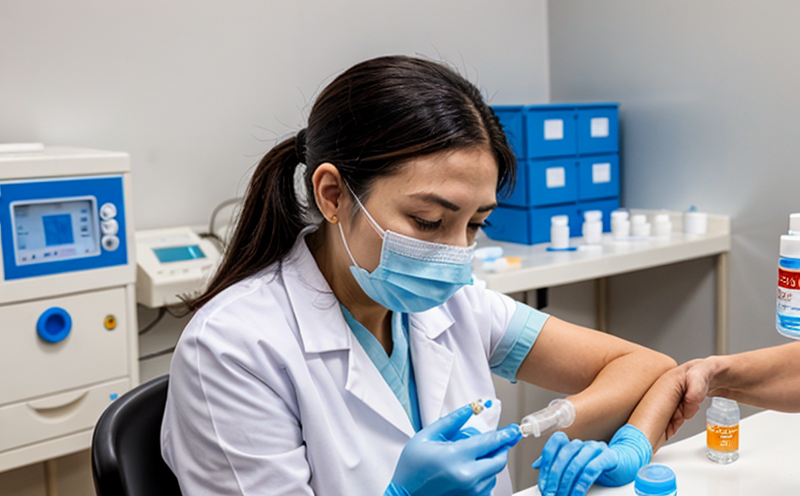WHO Residual Moisture Testing of Freeze Dried Vaccines
The World Health Organization (WHO) has established stringent guidelines to ensure vaccine quality and safety. One critical parameter in the evaluation of freeze-dried vaccines is residual moisture content, which can significantly impact their stability, shelf life, and overall efficacy. This service provides comprehensive testing for residual moisture content in freeze-dried vaccines as per WHO standards.
Accurate measurement of residual moisture is crucial because even small amounts of water can lead to degradation processes that may compromise vaccine potency. Freeze drying, or lyophilization, is a process used to preserve vaccines by removing water while maintaining the active ingredients. However, any remaining moisture can create an environment conducive to microbial growth and chemical instability.
Our laboratory adheres strictly to WHO guidelines (WHO 2019) for residual moisture testing using Karl Fischer titration—a precise method that quantifies trace amounts of water in samples down to parts per million levels. The process involves careful sample preparation, ensuring that the freeze-dried vaccine is reconstituted under controlled conditions before analysis.
Testing results are reported comprehensively, providing detailed insights into moisture content, batch-to-batch consistency, and potential quality issues. This information helps stakeholders make informed decisions about procurement, storage, and distribution practices to ensure optimal vaccine performance in diverse environmental settings.
By leveraging this service, pharmaceutical companies can enhance their compliance with global regulatory standards and contribute to public health by delivering reliable vaccines that meet the highest safety and efficacy benchmarks.
Scope and Methodology
| Parameter | Description |
|---|---|
| Sample Preparation | Reconstitution of freeze-dried vaccine under controlled conditions to simulate real-world usage. |
| Instrumentation | Karl Fischer titration apparatus for precise moisture content determination. |
| Tolerance Limits | Compliance with WHO standards (WHO 2019). |
| Data Analysis | Statistical evaluation of batch consistency and potential quality issues. |
The testing process begins with thorough sample preparation, ensuring that the freeze-dried vaccine is reconstituted accurately. This step is critical as it mimics the conditions under which vaccines are used in clinical settings. Following preparation, the samples undergo Karl Fischer titration analysis to measure residual moisture content.
Our laboratory ensures strict adherence to WHO guidelines for sample reconstitution and testing procedures. The results of these analyses provide detailed insights into the moisture content of each batch, helping manufacturers identify any deviations from expected standards. This data is crucial for maintaining consistency across production batches and ensuring product quality.
The Karl Fischer titration method allows for highly accurate measurements of even minute amounts of water in the samples. By comparing results against established tolerance limits, we can assess whether a particular batch meets regulatory requirements. Any discrepancies are flagged for further investigation or corrective actions as needed.
Quality and Reliability Assurance
Accurate residual moisture testing is essential for ensuring the quality and reliability of freeze-dried vaccines. Our laboratory employs a robust Quality Management System (QMS) that adheres to international standards, including ISO 9001:2015, to maintain high levels of precision and accuracy in our testing processes.
The QMS encompasses rigorous internal audits, continuous training for staff on the latest techniques and methodologies, and stringent quality control measures. These practices ensure consistent results across all tests performed by our laboratory. We also participate in proficiency testing programs organized by recognized bodies to validate the reliability of our methods and equipment.
Our commitment to excellence extends beyond technical competence; we prioritize transparency and communication with clients throughout the entire testing process. Our dedicated team works closely with each client, providing clear explanations of test procedures, expected outcomes, and any potential challenges or recommendations for improvement.
This comprehensive approach guarantees that our clients receive not only accurate test results but also valuable insights into their vaccine production processes. By working together, we can help pharmaceutical companies achieve the highest standards in vaccine quality assurance, ultimately contributing to better health outcomes worldwide.
Environmental and Sustainability Contributions
In addition to delivering reliable testing services, our laboratory is dedicated to promoting environmental sustainability. By adhering strictly to WHO guidelines for residual moisture testing of freeze-dried vaccines, we contribute positively to both public health and the environment.
The accurate measurement of residual moisture helps prevent unnecessary waste by ensuring that only optimally preserved vaccines reach market distribution channels. This minimizes the risk of product spoilage due to improper storage conditions or handling practices, which could otherwise lead to increased resource consumption during transportation and disposal.
Furthermore, our commitment to quality assurance through rigorous testing supports more efficient use of resources throughout vaccine development cycles—from initial R&D phases to large-scale manufacturing operations. By reducing waste associated with substandard products, we promote a more sustainable approach to pharmaceutical production.
Our laboratory also participates in various initiatives aimed at reducing carbon footprints and promoting eco-friendly practices within the industry. Through collaboration with other stakeholders involved in vaccine development and distribution, we strive towards creating a healthier planet for future generations.





